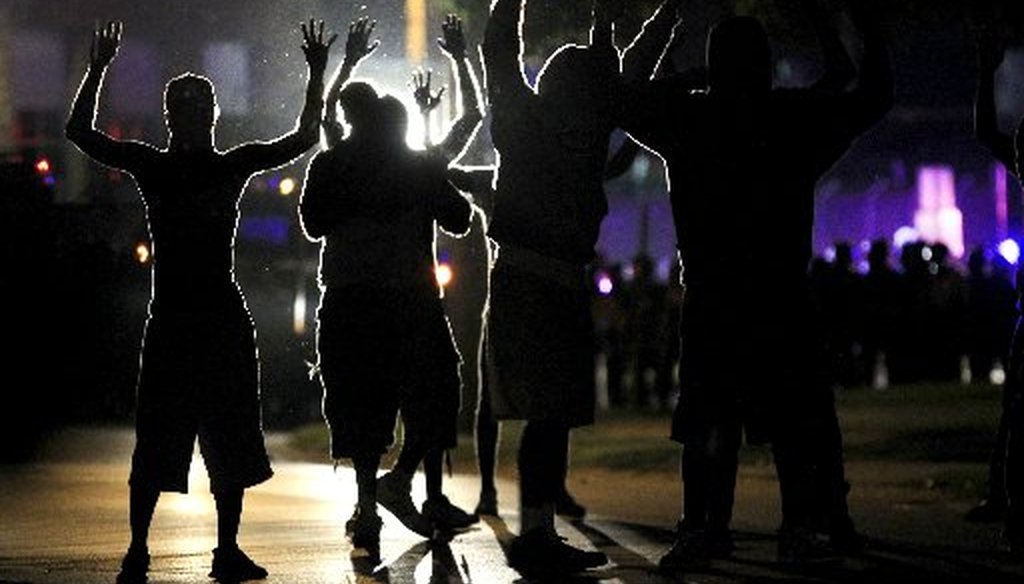Stand up for the facts!
Our only agenda is to publish the truth so you can be an informed participant in democracy.
We need your help.
I would like to contribute

People raise their hands for advancing police wearing riot gear on Aug. 11, 2014 in Ferguson, Mo. Several nights of protests erupted in the suburb of St. Louis after a white police officer shot a black man named Michael Brown on Aug. 9. (AP photo)
President Barack Obama took office vowing to "vigorously pursue" hate crimes and civil rights cases.
He also wanted to work to end racial profiling by police — a cause for which he’d been fighting since his days in Illinois politics.
Obama managed to direct his Justice Department and work with Congress to address the first two, but has come up short with lawmakers on the third.
He fulfilled a pledge to support the Matthew Shepard and James Byrd Jr. Hate Crimes Prevention Act, which he signed in August 2009. We rated it a Promise Kept.
That law broadened federal jurisdiction in prosecuting hate crimes and expanded the definition of a hate crime to include bias-motivated crimes based on a victim's actual or perceived "gender, sexual orientation, gender identity, or disability."
Sign up for PolitiFact texts
Before the law was passed, there were 45 states and the District of Columbia with their own hate crimes prevention laws, but they did not all cover the same categories of crimes.
Michael Lieberman, director of the Anti-Defamation League’s Civil Rights Policy Planning Center, credited the new law with providing a new focus on hate crimes.
"There were a lot of cases that went forward that would not have gone forward without the Matthew Shepard Act," Lieberman said.
The Justice Department went through a top-down cultural shift that emphasized these sorts of crimes, he said, and many U.S. attorneys committed themselves to carrying out the law. The Federal Bureau of Investigation also prepared a new hate crimes training manual with guidelines for treating cases that is now used as an example for local law enforcement.
In 2008, there were 9,168 offenses reported to the FBI. In 2015, the most recent numbers available, 6,885 offenses were reported, up about 7 percent from the year before. Reported crimes against Muslims were up 67 percent.
It’s important to remember a couple things about those figures, of course. One is that the stats are self-reported by local law enforcement agencies, and some major metropolitan areas didn’t report any hate crimes at all. Another is that any increase in reported cases could either mean there really is an upswing, or simply that victims feel like they can report them and have local police treat them as hate crimes.
Both the Anti-Defamation League and the Southern Poverty Law Center pointed to the new law as an example of the Obama administration’s larger focus on civil rights.
Obama’s first assistant Attorney General for Civil Rights, Thomas Perez, and his successors have helped direct the U.S. Justice Department to address abuses.
The Civil Rights Division actively pursued cases involving equal opportunities for employment and education and civil rights. The agency established a dedicated Fair Lending Unit to stop discriminatory lending practices against minorities, and pursued cases to ensure citizens with disabilities and overseas military personnel have the opportunity to vote.
We rated his vow to vigorously pursue hate crimes and civil rights abuses a Promise Kept.
Policy shift as tensions simmer
Congress did not share Obama’s enthusiasm to address racial profiling, however.
As an Illinois state senator, Obama sponsored and helped pass a law to curb the practice, and he co-sponsored legislation to ban the practice by federal agencies as a U.S. senator. He pledged to sign such a bill into law as president, but a bill never came.
Democrats in the House and Senate have been trying to pass the End Racial Profiling Act, or ERPA, since 2001. Versions of the bill prohibited federal agencies from using racial profiling, allowed people to sue for damages for being profiled and tied federal funding for state and local law enforcement agencies to anti-profiling guidelines.
The measure has been reintroduced over the years — the most recent version was introduced in both houses in 2015 and referred to committees — with varying degrees of support from the White House. But an outright ban has not been instituted.
Tensions flared during the Obama years over several cases in which local police officers killed unarmed African-Americans in places such as Ferguson, Mo., North Charleson, S.C.; and Cleveland.
Instead of waiting for a new law, Obama’s Justice Department instituted new rules for personnel to try to ease racial profiling by federal law enforcement agencies.
Attorney General Eric Holder in December 2014 announced a ban on racial profiling in national security cases. The rules aimed to prevent FBI agents from considering national origin, religion, gender, sexual orientation or gender identity when opening cases, as well as race and ethnicity. These were guidelines for state and local agents if they were acting as part of federal cases, but they weren’t binding.
"As attorney general, I have repeatedly made clear that profiling by law enforcement is not only wrong, it is profoundly misguided and ineffective," Holder said. "Particularly in light of certain recent incidents we’ve seen at the local level, and the widespread concerns about trust in the criminal justice process, it’s imperative that we take every possible action to institute strong and sound policing practices."
Also in 2014, the White House announced a task force on 21st century policing to help identify new and better ways for law enforcement to interact with their communities.
The Justice Department announced two years later it would continue to help implement the task force’s findings. The department then said it would train law enforcement agents to recognize and address implicit bias — underlying prejudices of which agents might otherwise be unaware.
Lieberman said the Justice Department worked to address complaints about police departments over the years. There was a concerted effort to fix problems in places like Ferguson, Cleveland, Seattle and New Orleans with consent decrees that Lieberman said "testify to the commitment to address police racial profiling and police bias."
Obama may not have gotten the law he wanted, but he still did what he could to steer policy away from profiling. We rate that promise a Compromise.
Our Sources
See relevant promises.


































